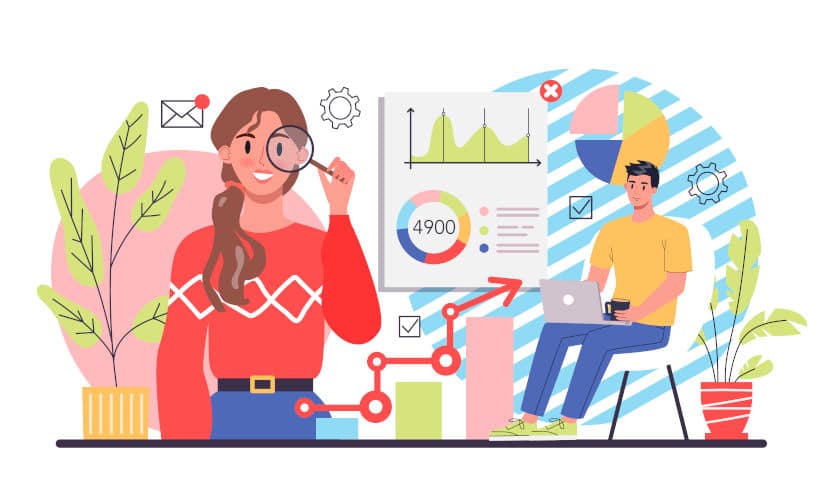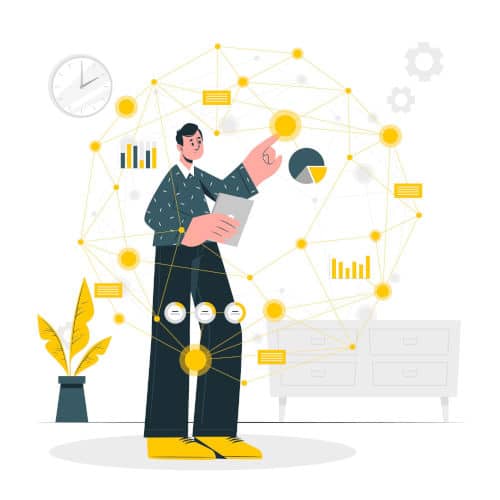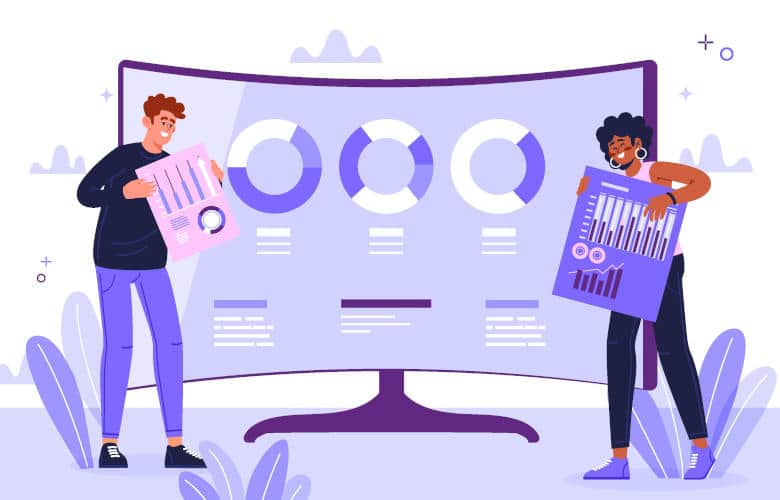The Citizen Data Scientist is a professional who does not specialise in data science, but has sufficient skills to carry out analyses in his or her field. Find out why this versatility has become indispensable in the corporate world!
In recent years, the field of data science has undergone a veritable transformation. Gone are the days when this discipline was the preserve of professional data scientists.
Now, as data becomes increasingly ubiquitous across all sectors, it’s the turn of business experts to harness analysis to unlock its full value and potential. We call them Citizen Data Scientists!
What is a Citizen Data Scientist?
This is an individual who, although not an expert in IT or statistics, nevertheless has sufficient skills to carry out data analysis in his or her professional field.
This concept has emerged over the last decade, stimulated by the growing need to involve a wider range of players in the data analysis process. And this goes beyond the specialists in the field.
However, it is above all the rapid development of technologies and the democratisation of self-service data analysis tools that have played a key role in the rise of the Citizen Data Scientist.
Analysis is now accessible to a wider audience, and this encourages its use by professionals who do not have in-depth technical expertise, but a real knowledge of their field.
Thanks to this new approach, they can interrogate the data in a truly relevant way, with knowledge of the specifics of their business and their sector of activity.
Like an expert data scientist, the citizen can predict customer reactions to marketing, identify new opportunities, optimise the logic chain, analyse financial risks and develop new strategies.

Citizen Data Scientist vs Data Scientist: what are the differences?
Generally speaking, expert data scientists and citizens do the same work.
However, the citizen is generally entrusted with less complex tasks and more direct analytical applications.
The expert must master Python, R, Julia and other Data Science languages, as well as the various tools and technologies used to create custom algorithms and complex analytical models.
They must also master all aspects of the Data Science process, from data discovery to DataViz, including cleansing and model selection and deployment.
For their part, citizen Data Scientists can compensate for their shortcomings thanks to AI and automation tools.
For example, AutoML simplifies the development and deployment of machine learning models without the need for coding.
Other tools can also be used to find and prepare relevant datasets and create data visualisations.
From an organisational point of view, expert Data Scientists are often members of a wider data science team alongside Data Analysts, Data Engineers and other specialists.
Citizen Data Scientists, on the other hand, tend to work independently to meet the needs of the business. They are not necessarily part of a dedicated team.
Despite the rise of automation tools, the professional Data Scientist is not about to disappear.
The Citizen Data Scientist does not replace this profession, but complements it by extending analysis capabilities to individuals in a variety of fields.
This includes marketing, finance, healthcare and many others.
While the Data Scientist excels in the complex manipulation of data, the Citizen Data Scientist brings an in-depth business understanding.
This creates a synergistic partnership between these two professionals, enabling data to be exploited to the full.
What skills do you need?
To become a Citizen Data Scientist, you need to learn how to manipulate data autonomously and intelligently. This requires a range of skills.
Programming languages such as Python and R, with their specialised libraries, are an essential foundation.
They offer the flexibility and power required to process and analyse complex datasets.
Although they do not need to be professional statisticians, Citizen Data Scientists must also have a solid understanding of basic statistical concepts. This includes the ability to interpret data, identify trends, and make decisions based on analytical results.
This skill enables the CDS to go beyond simply manipulating data, to extract meaningful information from it.

In addition, the professional must be able to formulate relevant questions based on the needs of his or her field of activity. This requires an understanding of the business objectives and the ability to translate these objectives into analytical queries.
Subsequently, they must be able to interpret the results obtained, contextualising them so as to provide usable information for decision-making.
At the same time, visualisation platforms such as Power BI or Tableau enable the results of analyses to be communicated effectively.
These software packages make it easy to create graphs and diagrams using templates and an intuitive interface.
What's in it for a company?
Within an organisation, the integration of Citizen Data Scientists offers a multitude of benefits and redefines the way organisations approach and use their data.
By leveraging their analytical skills, it becomes possible to make more informed, data-driven decisions. Combined with business knowledge, this leads to deeper insights and a better understanding of challenges and opportunities.
It also reduces reliance on data science experts, as a greater number of people can participate in the analysis. This improves organisational flexibility and agility by enabling a faster response to analytical demands.
Against a backdrop of a worldwide shortage of data scientists, this is a valuable addition. Especially as these experts are expensive: the average annual salary is $145,000 in the United States, and €60,000 in France.
The presence of Citizen Data Scientists also fosters innovation within the company, by encouraging creativity in the exploration and interpretation of data.
They help to generate new ideas and identify innovative opportunities. This strengthens the organisation’s competitiveness in the marketplace.
Many challenges remain
Despite the benefits listed throughout this dossier, the role of Citizen Data Scientist also presents challenges and concerns. Taking these into account is essential to ensure their successful integration into the business.
Unsurprisingly, the main limitation of the Citizen Data Scientist is that their technical skills are more limited than those of a professional Data Scientist. While they can perform basic data analysis, their understanding of advanced techniques, cleaning or statistical modelling may be less.
In order to remain effective while taking this ceiling into account, it is important to clearly define the scope of the CDS’s work to avoid errors of interpretation or decision-making.
Furthermore, the quality of the analyses depends directly on the quality of the data used. The Citizen Data Scientist must be aware of this, and take steps to guarantee the integrity of the data.
They must choose their data sources carefully, know how to detect and correct errors, and be able to validate the results obtained independently.
When processing sensitive data, they must also be trained in security protocols and comply with confidentiality standards such as the GDPR.

How to become a Citizen Data Scientist? The best advice
The role of Citizen Data Scientist is open to anyone within an organisation, but it is preferable to have experience in the area where data analysis will be used.
Familiarity with Data Science, Machine Learning, Data Mining, or predictive modelling and statistical analysis is also invaluable.
The best way to acquire these skills is to choose a bootcamp like those offered by DataScientest. In addition, there are many tutorials on YouTube, and open datasets to explore.
Sites like Kaggle also organise competitions to help you improve your data science skills. All these resources can help you make rapid progress.
Conclusion: the Citizen Data Scientist, a versatile professional adapted to modern challenges
By combining business expertise with analytical skills, the Citizen Data Scientist represents a bridge between their company’s field of activity and the power of data science.
Organisations across all sectors are increasingly recognising the value of this collaborative and inclusive approach to data analysis, and individuals are strongly encouraged to explore and invest in developing these skills.
It paves the way for a broader and more strategic use of information to drive innovation and success in an increasingly data-driven world…
To become a Citizen Data Scientist, you can choose DataScientest. Our various training courses will enable you to acquire Data Science skills such as Python programming, DataViz, Machine Learning, AI and Business Intelligence.
Thanks to the intensive BootCamp format, it only takes a few months to acquire real expertise from the comfort of your own home. Alternatively, you can opt for continuing education, so that you can progress at your own pace while continuing to work.
We also offer courses that combine Data Science and business expertise, such as the Digital Marketing & Data course. You’ll learn how to harness data to maximise digital marketing results!
At the same time, our Power BI training course will enable you to master Microsoft’s self-service Business Intelligence solution in just 2 to 5 days full-time or 30 days part-time. You will receive official Microsoft PL-300 certification.
All our training courses are distance learning, our organisation is eligible for funding options and you will be able to obtain a state-recognised diploma as well as certification from our cloud partners AWS and Microsoft Azure! Discover DataScientest!

Now you know all about the Citizen Data Scientist. For more information on the same subject, check out our dossier on Business Intelligence and our dossier on DataViz!










